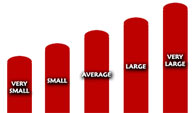Penis size matters to gay men's self esteem: Dutch study
According to a recent study by Holland's Utrecht University, researchers have found that a gay man's self esteem is directly linked to the size of his penis.

"Our study reveals that how gay men see their penis has considerable influence on how they value themselves in general," Woertman said about the survey of 251 gay men with an average age of 29. The men surveyed said their penises were the most attractive parts of their body, followed by their stomachs and their skin.
"It is not known whether if there is a similar link in heterosexual men, but there are various reasons for assuming that the self-image of heterosexual men is linked to how they evaluate the most characteristically masculine part of their body," she added.
The psychologist believes that gay and straight men differ little from each other, and that their attitudes are converging regarding appearance as men are increasingly being seen as sex objects.
"Appearance has thus become more important for the straight man," she said, calling for more research into how heterosexual men see their bodies. She suspects that contemporary men are less satisfied with their appearance than earlier generations.
What do you think?
POST/READ COMMENTS
Malaysia Police conduct second round of raids on 'gay' spas
According to the Malay Mail today, two other 'gay' spas in the Malaysian capital of Kuala Lumpur was raided by the Police last Friday, a second sting operation in two weeks.
The two establishments reported to be located in Jalan Pudu Lama and Jalan Bukit Bintang are suspected of being gay joints and the Police acted on a tip-off after monitoring the two premises for five days.
The report, which was accompanied by two photos showing unidentifiable men in the establishments, revealed that more than 21 men, including eight workers, aged between 20s and 30s, were screened during the two-hour raid on Friday evening.
The spa in Jalan Pudu Lama, which is believed to be three years old, has been offering massage services without a licence.
The spa and massage parlour in Jalan Bukit Bintang was raided by the Police on Feb 10. Earlier reports revealed that Police found men who were nude in several rooms as well as used condoms. During it's subsequent raid, Police also found three used condoms occupied by two men "clad only in towels."
The massage parlour was also issued a summons for operating without a licence.
On Feb 10, police raided two other establishments in Jalan Utara off Jalan Imbi and Jalan Sultan Ismail and tested 25 men for drug use. They were reportedly released after testing negative.
POST/READ COMMENTS
Moms' Genetics Might Help Produce Gay Sons
A new US study has added a twist to the gay gene debate.
Researchers of the study are now suggesting that the genetics of mothers who have multiple gay sons act differently than those of other women. Their findings appear in the February issue of the journal Human Genetics.
They found that nearly one fourth of the mothers who have more than one gay son processed X chromosomes in their bodies in the same way - meaning one X-chromosome is much more likely to be methylated ("disabled" in layman's terms) than the other in mothers of gay sons.
While females have two X chromosomes, they actually require only one and routinely inactivate the other at random. "It's like flipping a coin," said co-author Sven Bocklandt, a postdoctoral researcher at the University of California at Los Angeles. He explained that both men and women have basically one functional X chromosome. And while men have both an X and Y chromosome, the Y chromosome plays a much smaller role.
In the new study, researchers looked at 97 mothers of gay sons and 103 mothers without gay sons to see if there was any difference in how they handled their X chromosomes.
"When we looked at women who have gay kids, in those with more than one gay son, we saw a quarter of them inactivate the same X in virtually every cell we checked," Bocklandt said. "That's extremely unusual."
Forty-four of the women had more than one gay son. In contrast, 4 percent of mothers with no gay sons activated the chromosome and 13 percent of those with just one gay son did.
The phenomenon of being more likely to inactivate one X chromosome - known as "extreme skewing" - is typically seen only in families that have major genetic irregularities, Bocklandt said.
Still, there are caveats. Dr. Ionel Sandovici, a genetics researcher at The Babraham Institute in Cambridge, England, told Forbes that most of the mothers of multiple gay sons didn't share the unusual X-chromosome trait. He also highlighted that study sample is small, and requires more research.
Meanwhile, critics of the gay gene theory are concerned that if the theory is found to be true, it might be used as a method of preventing homosexuality in utero, or perhaps even after.
Bocklandt however defended the need of such research. "We're trying to understand one of the most critical human traits: the ability to love and be attracted to others. Without sexual reproduction we would not exist, and sexual selection played an essential role in evolution," he said.
"Yet, we have no idea how it works, and that's what we're trying to find out. As with any research, the knowledge you acquire could be used for benefit or harm. But if [scientists] would have avoided research because we were afraid of what we were going to find, then we would still be living in the stone age."
